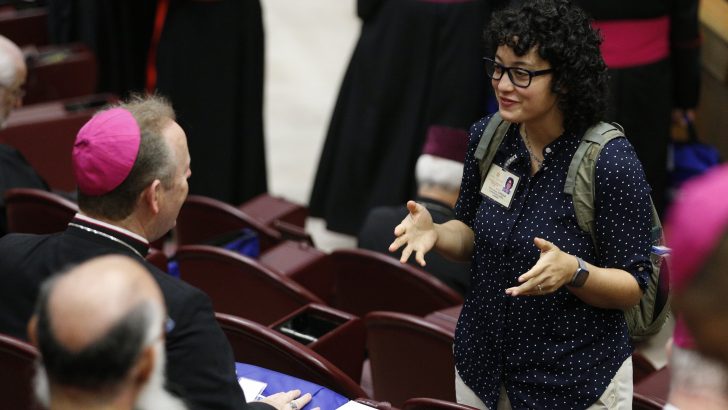Virtually everyone taking part in the October 3-28 Synod of Bishops on young people has said that the presence of more than 30 young delegates inside the hall has altered the chemistry – it’s looser, more informal, more pumped-up, and above all, more raucous.
The young people, participants say, let you know immediately which speeches they like by cheering, applauding, even hooting like a studio audience at the filming of a reality television show.
Back in the day, such behaviour would have been frowned upon, if not actively discouraged. In previous synods, officials have sometimes reprimanded participants for applause, considering it indecorous and unfair to those who don’t get it. This time around, however, such restraint has basically gone out the window, making audience reaction one useful gauge for which messages really resonate.
By that standard, one topic above all stands out, which may be no surprise given that synods are always an education in the realities of the global Church: anti-Christian persecution.
The two most sustained ovations so far have been for an Iraqi youth and an Indian archbishop, both of whom recounted direct stories of suffering and persecution on account of the Faith in the 21st Century.
Safa Al Alqoshy, a Chaldean Catholic from Baghdad, spoke during the synod’s second week, describing the suffering of Christians in his country at the hands of the Islamic State and other forms of jihadi radicalism.
“It’s very important to pay attention that there is not only persecution by killing, there is a persecution by psychology, by feelings. You feel that you are alone, that you are not supported,” he said in an interview with Crux shortly after his speech on the synod floor.
Horrors
Last Thursday, Archbishop John Barwa of Cuttack-Bhubaneswa described the horrors of an anti-Christian pogrom that unfolded in the district of Kandhamal in 2008, which left more than 100 people dead.
He told the story of Rajesh Digal, a young catechist who was murdered by Hindu fundamentalists on August 26, 2008. The mob tried to force Digal to convert, Barwa said, and, when he was buried in mud up to his neck, asked if he’d give up Jesus Christ.
“He closed his eyes, looked up at him and said ‘no!’ And the man dumped the stone on his head,” Barwa said. “He silently gave witness of the God of life. And this is only one story. There are so many powerful stories of faith.”
Barwa also spoke to Crux in an interview shortly after his talk on the synod floor. A member of India’s long-oppressed tribal minority, Barwa’s own niece, a Catholic nun, was gang-raped during the violence.
What do we make of the fact that these are the two speeches so far that seemed to stir people and generate the loudest expressions of solidarity and appreciation?
First, that in this sense the Synod of Bishops probably is akin to any other random collection of people these days, in that what I once called the “global war on Christians” remains not only the most dramatic Christian story of our time, but the most untold.
In the wake of ISIS in Iraq and Syria, the idea of Christians as victims of persecution there has become depressingly familiar. However, the unawareness of the global scale of the scourge is likely what made Barwa’s account from India so compelling – despite the fact that, statistically speaking, India is among the most dangerous places on earth to be a Christian these days, with an average of one physical assault every other day.
Overall, the low-end estimate for the number of new Christian martyrs every year in the early 21st Century is about 7,000 to 8,000, while the high end is close to 100,000. (Precision is notoriously elusive due to the difficulty of obtaining counts in conflict zones, and also debate over what counts as “anti-Christian” violence.)
Either way, that works to one new martyr every hour or one every five minutes. Even aside from Christian concern, that’s a human rights crisis of staggering proportions.
If ignorance is the bad news, here’s the good: Once people become aware of what’s happening, they want to help.
Bishop Frank Caggiano of Bridgeport, for instance, one of the American prelates taking part in the synod, said that he was inspired to think about ways in which his fairly affluent diocese could help – perhaps by twinning relationships with parishes in parts of the world where Christians are targets, for instance, or opportunities to involve his young people in direct service projects for suffering churches.
That’s just one bishop’s response, but it suggests a broader movement of hearts and minds in the synod in response to the stories of the new martyrs of the day.
Finally, these stories are also a sobering reminder for the synod against becoming exclusively bogged down with the problems of affluence, meaning the sorts of debates that are a luxury churches facing more existential threats can’t afford.
Such perspective is part of the price of admission for membership in a global Church – one in which, though you’d often never realise it from media coverage or professional society meetings, the affluent West represents an ever-shrinking share.
John L. Allen Jr is Editor of CruxNow.com


 John L. Allen Jr.
John L. Allen Jr. Sr Briana Santiago, a member f the Apostles of the Interior Life from San Antonio, talks with Archbishop Eamon Martin before a session of the Synod of Bishops in Rome this week. Photo: CNS
Sr Briana Santiago, a member f the Apostles of the Interior Life from San Antonio, talks with Archbishop Eamon Martin before a session of the Synod of Bishops in Rome this week. Photo: CNS 